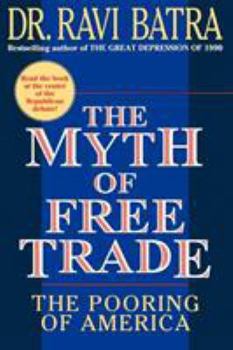The Myth of Free Trade: The Pooring of America
Select Format
Select Condition 
Book Overview
In a front-page story in the Wall Street Journal, Pat Buchanan named The Myth of Free Trades as one of the cornerstones of his protectionist economic policy. Written by Dr. Ravi Batra, bestselling economist and author of The Great Depression of 1990, The Myth of Free Trade throws down the gauntlet to economic orthodoxy and challenges the gospel of free trade. Dr. Batra states that "laissez-faire has wrecked U.S. industry and shattered the American...
Format:Paperback
Language:English
ISBN:0684833557
ISBN13:9780684833552
Release Date:May 1996
Publisher:Touchstone Books
Length:288 Pages
Weight:0.90 lbs.
Dimensions:0.7" x 6.0" x 9.1"
Customer Reviews
4 ratings
The BEST book in debunking the B.S. that is "free trade"
Published by Thriftbooks.com User , 14 years ago
If you want to understand the reasons behind the economic meltdown in the U.S., then this is the book for you. Send to everyone in your immediate family as a great gift. One that will educate!!!!!! The best gift of all!
Is Free Trade really Free?
Published by Thriftbooks.com User , 18 years ago
SMU Professor Ravi Batra's significant work outlines why America has become a debtor nation. The main cause is free trade. This policy has caused real wages to fall for 80% of the work force despite increased productivity because of manufactured goods falling relative price. This phenomenon is known as "agrification". Moreover, poor leadership has allowed foreign nations such as Japan, South Korea, and China to sing free trade's praises while following protectionist policies as tariffs, quotas, exchange controls and the like at home. The post WWII General Agreement on Tariffs and Trade rounds or negotiations have resulted in a lack of reciprocity for American exports. Before GATT lowered tariffs, to permit imports to flood U.S. markets, the country was largely a closed, self-sufficient economy. However, since we have become an open economy the country has become awash with red ink in the current or trade account. To remedy this critical situation, Dr. Batra suggests a national policy of "competitive protectionism". This solution entails raising the average tariff from 5% to 40% while promoting domestic competition to spur innovation by prohibiting most mergers and monopolies. The result might be an improved living standard for Americans. The standard of living has declined for most workers as measured by the real wage since 1973 - - the year the U.S.A. became an open, free trade economy.
Myth of "Free" Trade now needs a follow-up
Published by Thriftbooks.com User , 20 years ago
Batra has done a fine job of pointing out the problem. Some want more figures, but the key here is the concept of "averaging". For that, I wish Batra had given us a simple example like the one below:With some 6 Billion People on the planet, 5 Billion earn less than $1,000 per year (say $5 Trillion) - only about 1 Billion earn around $25,000 or more ($25 Trillion) - with 300 Million those in the USA. So, if 6 Billion people "share" the $30 Trillion total World GDP, that means an "average" of $5,000 for each person. While a peasant in China might be temporarily better off, it would mean the economic end of the USA, Japan and Europe, then total collapse for the West. If China's current goal is to conquer the West, they can do it without a shot fired - just keep exporting while we keep importing and closing factories.I only hope that Batra writes a follow-up book quite soon and offers up an overview that all of us can internalize. My further hope is that he can present his comments on CSPAN, CNET and CNN before the US election in November.
Well thought out
Published by Thriftbooks.com User , 24 years ago
Well done. It's a shame however that Batra doesn't follow through on this topic in his later books, and gets side-tracked instead by other factors which at best have secondary impact on global economy and ecology. After suffering an entire generation (30 years) of decoupling of per capita productivity and per capita real wage, one wonders how much more stress the US economy can take before it collapses. Then again, what are the limits of human ingenuity and resiliency? Can these factors reverse the damage done by the Free Trade policy? Batra's addressing this factor would have been extremely helpful.






